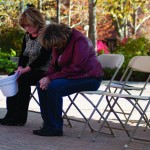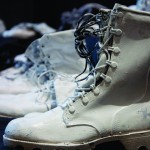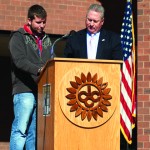Scars of post-traumatic stress disorder
By Ben Markley
During Veteran’s Week, 69 pairs of white, empty boots sat in the Carlsen Center as a vivid reminder of the damaging effects of war on soldiers.
“Every boot represented a soldier from Kansas or Missouri who came home and committed suicide,” said adjunct associate professor of psychology Susie Sympson.
According to a study done by the U.S. Department of Veterans Affairs (VA) in 2008, four to five veterans commit suicide every day.
One contributing factor to what Sympson said was a “skyrocketing rate” of veteran suicides is post-traumatic stress disorder (PTSD). She described PTSD as a delayed reaction to a traumatic experience which can cause emotional or physical distress, or paranoia.
“They walk around with arousal [of the nervous system] level really high all the time, so by the time they realize it’s going out of control, it’s too late,” she said.
Sympson recounted a story from a veteran student panel where a returned soldier’s daughter came into his room and woke him up one night, and his instinct told him he was being attacked.
“If his wife hadn’t been there to throw herself in front of the little girl, he probably would’ve killed her,” Sympson said. “That’s not rare.”
Approximately 300,000 veterans of the Iraq and Afghanistan wars are likely to suffer from either PTSD or major depression, according to http://veterannewsroom.com
Paul Riley, lieutenant colonel for the U.S. Army, recently returned from a year-long tour in Afghanistan. He said PTSD diagnoses are not surprising among veterans.
“When I hear that somebody has some issues related to PTSD or some issues related to their time in the combat zone, I’m not shocked by it,” Riley said. “I take that as just an unfortunate but expected consequence of service in a really dangerous spot.”
Sympson said there are remarkable similarities among a large number of Vietnam veterans who experience the disorder.
“They live in the country with really long driveways, they keep loaded weapons, they don’t go out to eat,” she said. “They hate the fourth of July. Loud noises, smells, a little kid—anything can bring back experiences.”
She said symptoms of PTSD include exaggerated startle responses, withdrawing from others, lack of sleep, nightmares, depression, substance abuse or becoming a workaholic.
“They have to have something to take their mind off of it, whether it’s self-medication or distraction,” she said. “It’s like a severe emotional insulation because of everything they’ve seen and done. They can’t involve themselves that deeply because it hurts.”
Sympson said PTSD is not a new phenomenon. In the Civil War it was called “soldier’s heart.” It was referenced as battle fatigue or shell shock throughout the World Wars. The PTSD diagnosis was established during the Vietnam War.
“There are still a good portion of people who don’t believe in [PTSD],” Sympson said. “They think the soldiers are malingering.”
Riley said the military has been successfully dealing with attitudes concerning the disorder.
“The Department of Defense has done a really good job of taking away any stigma that might be associated with PTSD,” Riley said.
He emphasized that the disorder has various manifestations, and many soldiers with PTSD are still capable of serving their country through the military.
“These warriors that suffer from PTSD are just as brave and just as courageous and just as honorable as if they had come back without any problems,” Riley said. “These individuals are still effective warriors and service members, but they’re suffering from some of the consequences of this war.”
Sympson said, while PTSD is treatable, many veterans do not seek proper treatment due to fear, shame, or embarrassment. She said suffering veterans can benefit by contacting VA or joining Active Minds or the Veterans Club.
“The college has counseling services for veterans and their families through the JCCC Counseling Center which is located in the Student Success Center,” said Kena Zumalt, Veterans Administration advisor.
Veterans and their families in need of confidential help can call 1-800-273-8255 and press one for a crisis line. For more information, visit the college’s veteran services page at http://www.jccc.edu/veterans/.
Contact Ben Markley, news editor, at bmarkle2@stumail.jccc.edu.
























